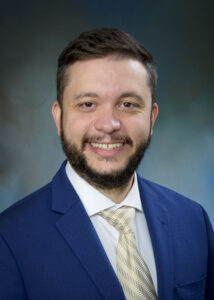Physical therapy student lands prestigious role in national organization
- March 28, 2024
- By: Eric Griffey
- Our People
Related Links
 When Jonathan Hansen was an undergraduate intern at Texas Health Arlington Memorial Hospital, he encountered a man who had just suffered a stroke. The patient’s right side was completely paralyzed. Hansen, now a first-year student in The University of North Texas Health Science Center at Fort Worth’s Department of Physical Therapy, worked closely with the patient.
When Jonathan Hansen was an undergraduate intern at Texas Health Arlington Memorial Hospital, he encountered a man who had just suffered a stroke. The patient’s right side was completely paralyzed. Hansen, now a first-year student in The University of North Texas Health Science Center at Fort Worth’s Department of Physical Therapy, worked closely with the patient.
“I looked forward to seeing him every day,” Hansen said. “He was always so optimistic about getting better.
“We worked with him for a few months,” he continued. “I watched him progress from being strapped onto an arm bike to gripping the arm bike, and then from being in a wheelchair to using a walker. One day he walked into the clinic and just stood there. It was that moment when I knew I’d made a difference.”
After that experience and others, Hansen realized he wanted to specialize in neurological physical therapy, which brought the Fort Worth native to his hometown for graduate school. He recently achieved an important milestone toward that end: Hansen was selected as the American Parkinson’s Disease Association Liaison for the Academy of Neurologic Physical Therapy, an honor not normally given to first-year students.
“Typically, working professionals or physical therapy graduates seek and are appointed to leadership positions such as this one,” said Dr. Michael Furtado, associate professor and chair of HSC’s Department of Physical Therapy. “We are so excited for Jonathan to have been selected as a liaison as a first-year student in a PT program. This demonstrates his excellence, excitement and passion to serve those with a neurodegenerative condition like Parkinson’s. The work he will get to collaborate on will bring notoriety to himself, the program, the profession and then ultimately people living with Parkinson’s. I cannot wait to see all he achieves in this role.”

Parkinson’s disease is a common neurodegenerative disease of aging, with an estimated 9.4 million people living with the disease worldwide. PD presents with a range of motor and non-motor symptoms — such as tremor, gait instability, depression and anxiety — that decrease function and quality of life.
Hansen’s duties as liaison include helping clinicians and patients connect with important resources, like free yoga classes, bingo nights and other social events for people with Parkinson’s Disease.
“The community for people with Parkinson’s is small in Texas,’ Hansen said. “It’s very difficult for them to maintain relationships. I’m able to find events and resources for clinicians to relay to patients and/or patients to access for themselves to make sure they’re aware of these opportunities for community and support.”
Clinically, people with PD and their caregivers also report social withdrawal as a result of PD. Social isolation has been linked to early mortality and other negative health outcomes, particularly in older adults.
Hansen, who is also vice president of the of the DPT ’26 cohort, said he applied for the liaison position to bolster his chances of landing at his preferred clinical residency program. He approached Furtado, who suggested he consider applying.
“I asked [Furtado], ‘What can I do now instead of waiting for my third year to get ahead of the application process.’ He suggested I get involved with the Academy of Neurologic Physical Therapy.”
Hansen’s term is for one year, and the time obligation is roughly 3-4 hours a month — still a considerable commitment for a first-year DPT student. He can reapply after his term has expired.
Landing this role brings him one step closer to getting back to where he wants to be – helping patients suffering from serious neurological issues.
“HSC was my No. 1 school, and I knew that this department had a lot of faculty members with a neuro background,” he said. “When I was going through application process, I knew that this would be the program for me.”






Social media